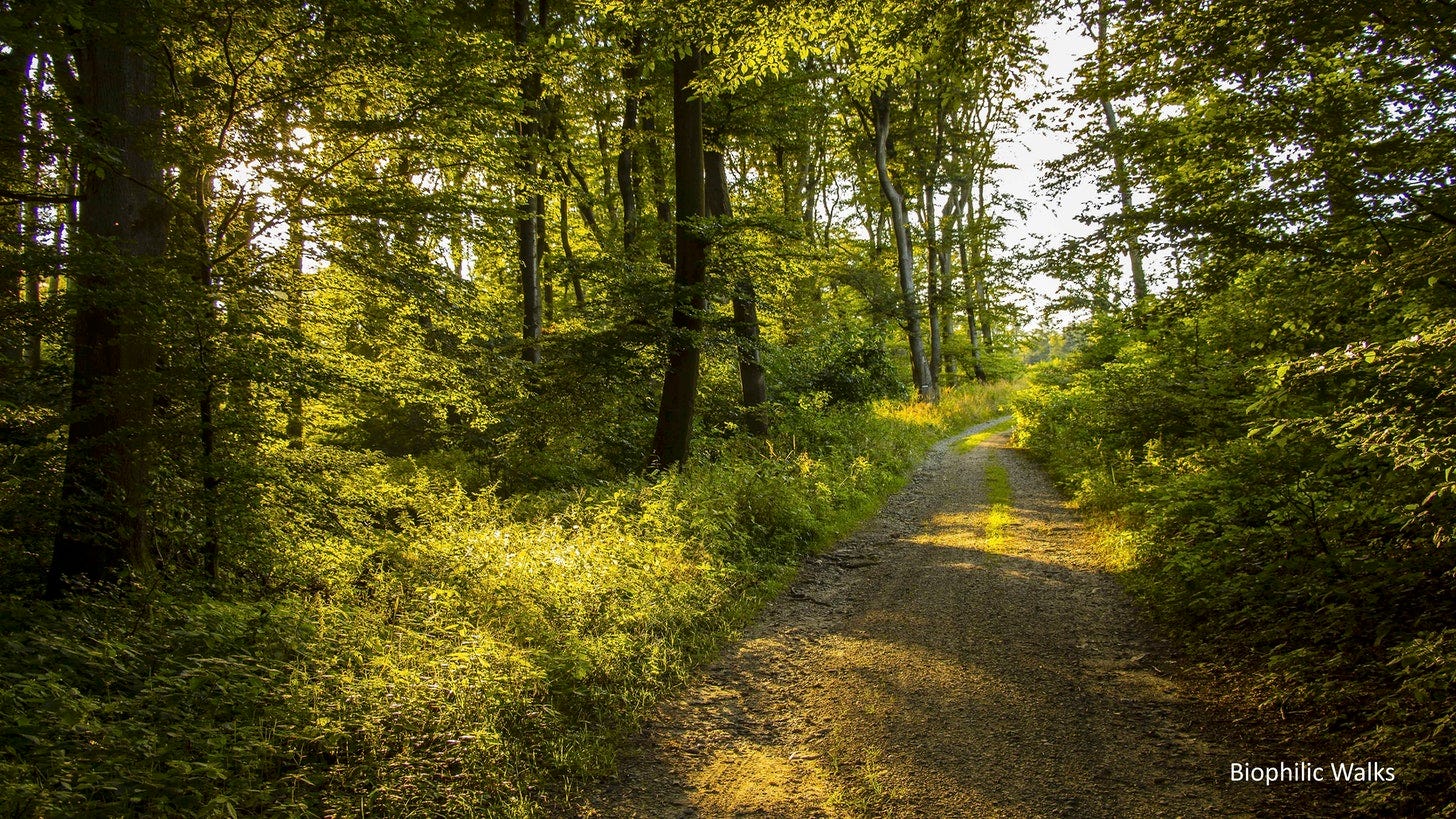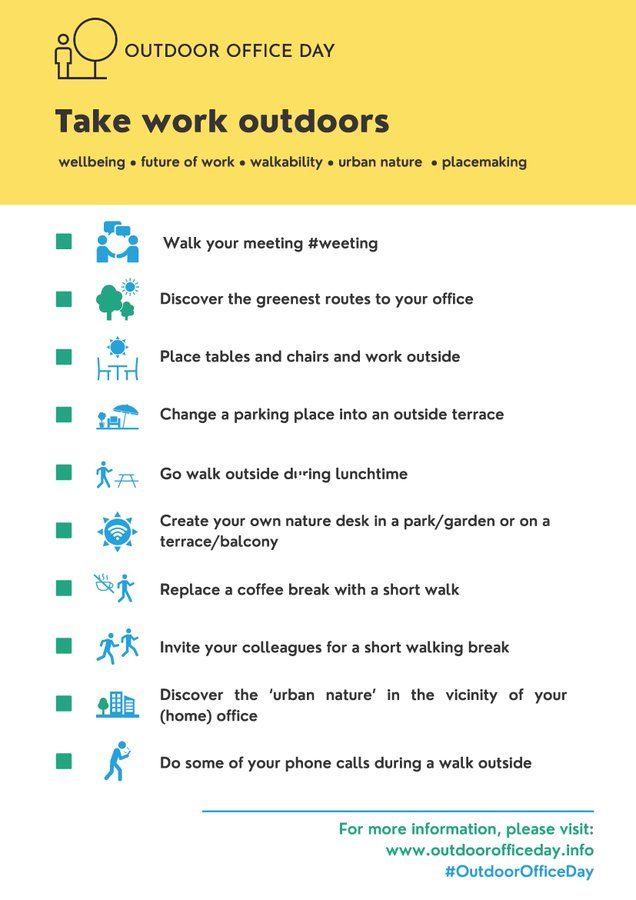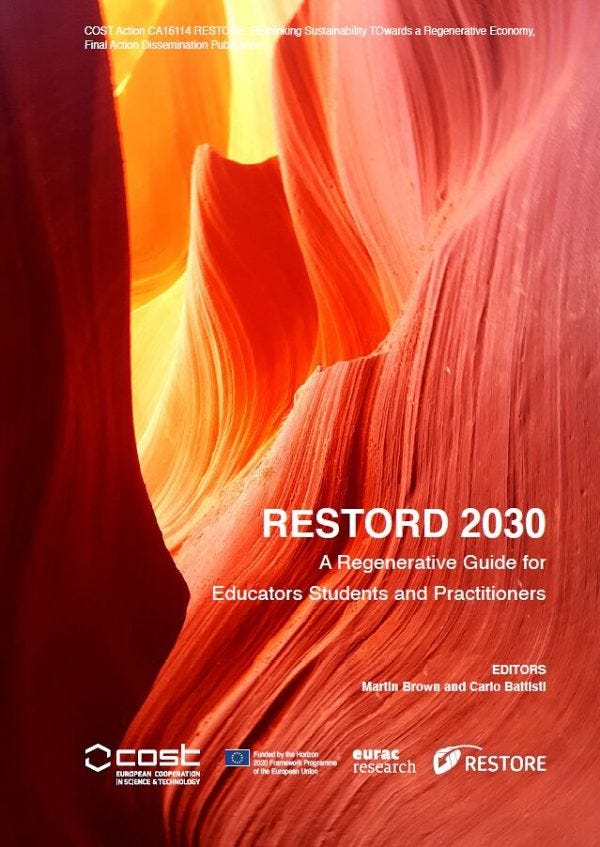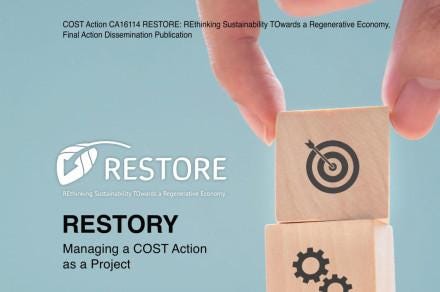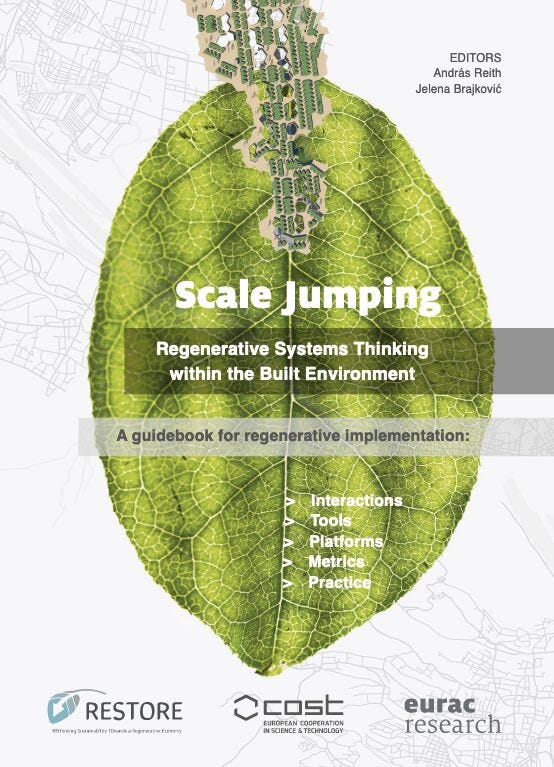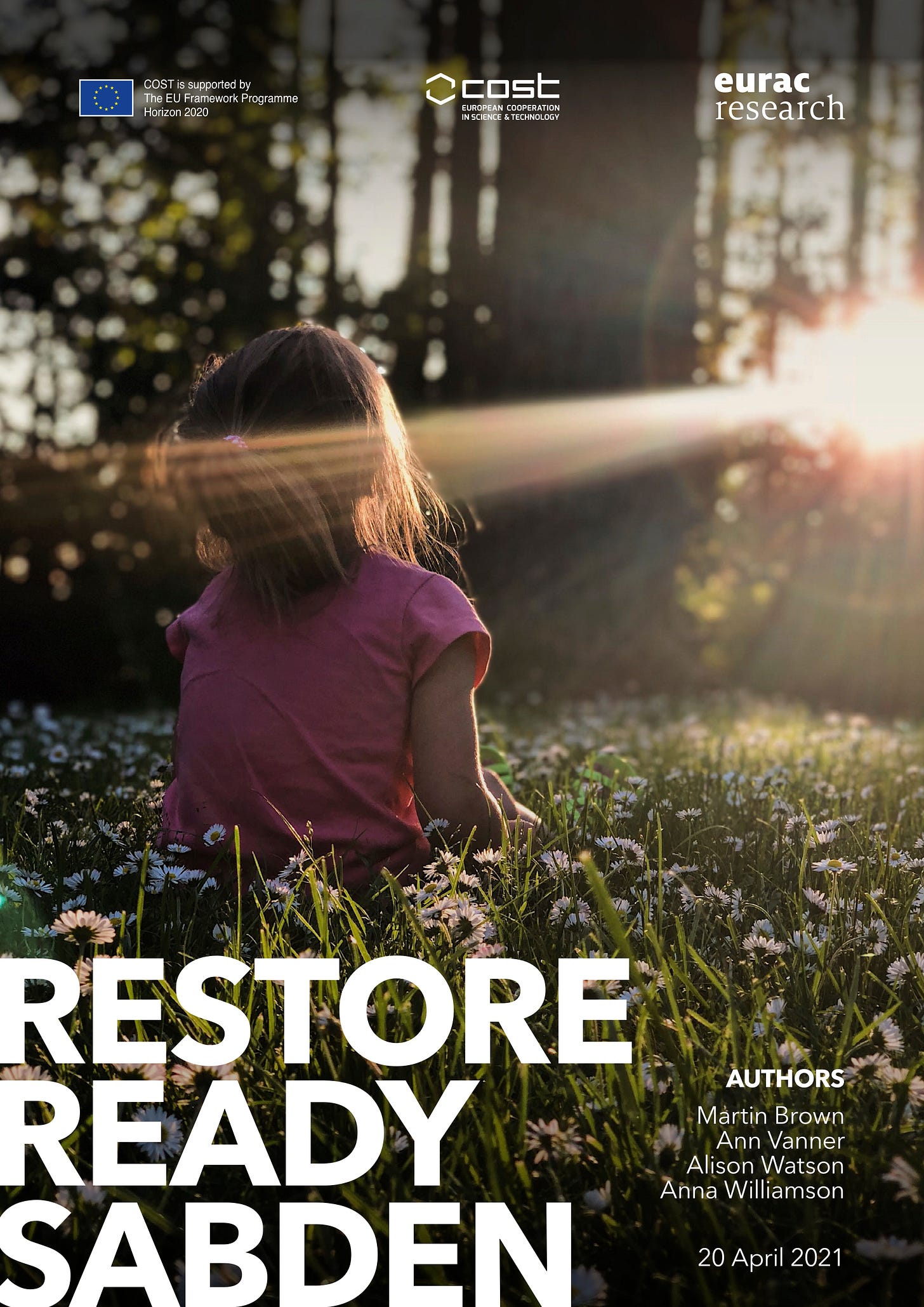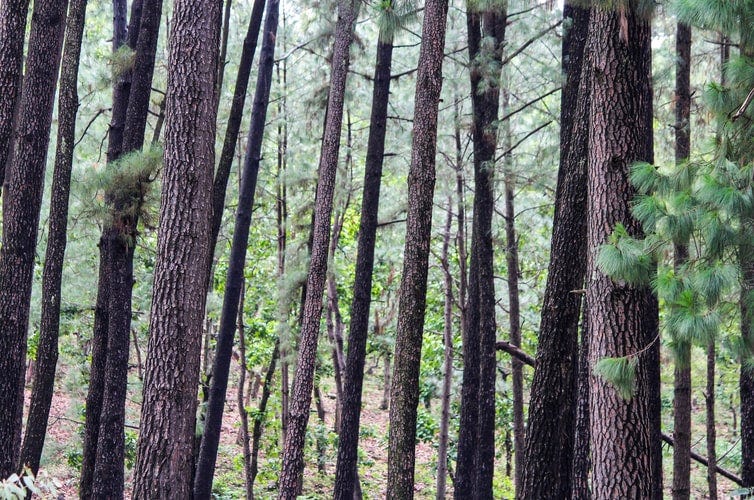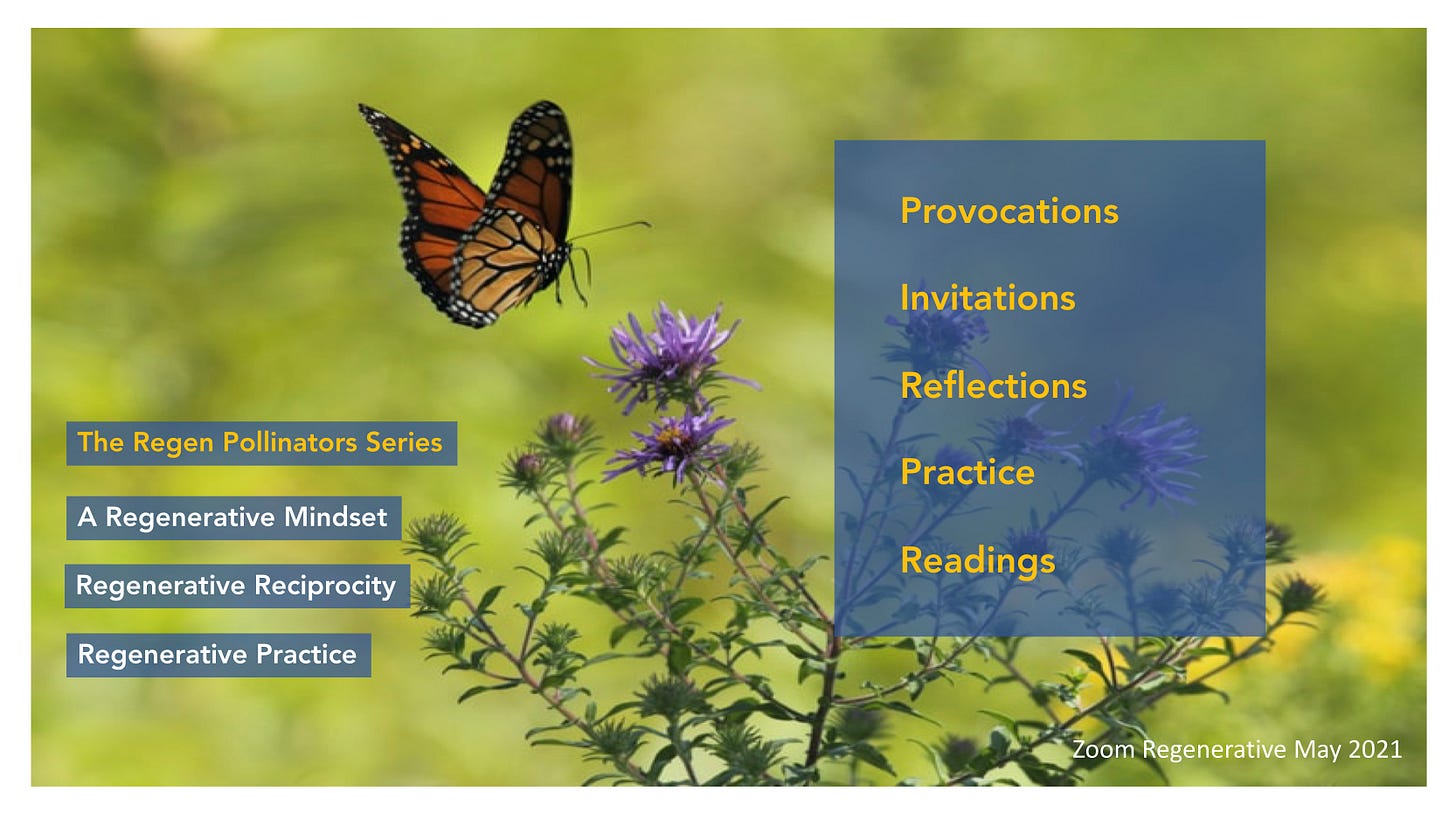Regen Notes #10
Walking, Mental Health, Biophilia, Slow Ways, Getting Involved, RESTORE, Carbon, Pollinators,
Welcome to Regen Notes, your fortnightly newsletter of regenerative news, stories and more that pass through my feeds, with a sideways focus on the built environment, curated by Martin Brown. Regen Notes is a companion to Zoom Regenerative.
As this week is Mental Health Awareness Week, and for 2021 has a theme of ‘Nature’, this edition of Regen-Notes celebrates Walking
Wonderlust. Rebbeca Solnit
Walking, ideally, is a state in which the mind, the body, and the world are aligned, as though they were three characters finally in conversation together, three notes suddenly making a chord. Walking allows us to be in our bodies and in the world without being made busy by them. It leaves us free to think without being wholly lost in our thoughts.
I suspect that the mind, like the feet, works at about three miles an hour. If this is so, then modern life is moving faster than the speed of thought, or thoughtfulness.
Many people nowadays live in a series of interiors — home, car, gym, office, shops — disconnected from each other. On foot everything stays connected, for while walking one occupies the spaces between those interiors in the same way one occupies those interiors. One lives in the whole world rather than in interiors built up against it.
Biophilia Walks
Biophilia, the love of life, and Reciprocity featured within the 2nd of 3 Zoom Regenerative Pollinator series, asking the question: What is the best way to design a biophilic building? Go for a walk, in a forest if possible and take the project team. (Biophilic Walks)
Slow Ways
Has featured many times on Regen-Notes and it is a delight to welcome one of the founders and visionaries of SlowWays, Dan Raven Ellison as our guest on the next edition of Zoom Regenerative on the 18th of May.
Slow Ways is a positive and timely initiative. Walking can improve health and wellbeing, help tackle climate and ecological emergencies, save people money, improve our environment, create memories and bring joy to people’s lives.
Taking the office outside.
May 27th is #OutdoorOfficeDay coordinated by NatureDesks. Get involved by working outdoors, taking a walking meeting, doing your emails from under a tree or take your lunch break in the local park. Place details of green outdoor meeting and eating locations, within walking distance of the site or office, on your notice board.
Nature
To #ConnectWithNature during #MentalHealthAwarenessWeek simply take a moment to tune into and notice nature. Miles Richardson has top tips on connecting with nature to improve your mental health on the Mental Health Foundation site.
Why Walking in Woods is Good for You - Woodland Trust
Walking is a great way to exercise. It’s one of the simplest ways to keep fit, it’s free and there’s no need for equipment. Combine that with time in the natural environment – which is good for us whether we’re exercising or not – and your physical and mental health are both set for a boost.
Wellbeing Economy
A worthwhile petition for Mental Health Awareness Week calls for a Shift to a Wellbeing Economy: put the health of people and the planet first.
Getting Involved
The Environmental Audit Committee is holding an inquiry into the sustainability of the built environment. It will look at the best routes to net zero for our future building needs from low carbon materials through to policies to minimise the whole-life carbon impact of new buildings. https://committees.parliament.uk/call-for-evidence/440/sustainability-of-the-built-environment/ You have until Friday on this one
Living Future Europe
“Specialists wanted for the newly established Living Future Europe ‘Technical Advisory Group’ (TAG). Volunteer work. Tough task. Complicated boundary conditions. Challenging positive results. Honour and recognition in event of success”
At LFE we are seeking passionate experts on ILFI programs and related topics, (regenerative design construction and economy, European, national, regional, or local regulations) willing to support the acceleration in the paradigm shift and change the world.
RIBA / Architects Declare
... are calling on the world’s governments to provide the necessary support and legislation to accelerate the systemic change in our industry to stay within the 1.5°C carbon budget. There must be no more delays or excuses.
... have launched an open call for evidence and research around six key themes. Submissions will be selected for the final report, culminating in its discussion at the Built Environment Summit to be held virtually and in London the week before COP26
Regenerative Body of Knowledge (RBoK)
Adding to the formable Regenerative Body of Knowledge (RBoK) from the RESTORE programme, there has been a raft of publications released this week as the 4 years EU Cost Action RESTORE winds up. Check out these new additions and other publications
RESTORD 2030
A #regenerative guide for educators, students, and practitioners.
A dissemination ‘portal’ both reflecting and enhancing on #COSTRestore work with new reflections on #education and awareness interventions.
A primer for the (re)imagination of a city (#RESTORD) ten years into the future
RESTORY: Managing a COST Action as a Project
Scale Jumping: Regenerative Systems Thinking within the Built Environment
RESTORE READY SABDEN Proceedings from the RESTORE event held in Sabden on the 20th of April
Carbon
Breaking news is that the RESTORE programme will be carbon neutral, if not carbon positive. Verification and details in future Regen-Notes
“Over the four years of the RESTORE action, we have travelled an estimated 3 million km., using a variety of transportation means, predominantly aviation. There is also a considerable impact arising from local travel to and from airports. At the end of the project, we had produced approximately 240 tonnes of CO2.”
Net-zero - the defining lens in addressing the climate crisis.
A reminder of how activism and dedication can have a huge impact. An illustration of the Trim Tab effect on climate change. A recent article in the Conversation: Net-zero: despite the greenwash, it’s vital for tackling climate change points out that The necessity of reaching net-zero emissions globally is abundantly proven in science, and governments pledged in the 2015 Paris Agreement to achieve “a balance between anthropogenic emissions by sources and removals by sinks” in mid-century, in pursuit of holding global warming to 1.5℃”
With the reminder that (Net-Zero) “was included in the Paris Agreement only because of a determined push by activists and vulnerable countries. And it’s hard to think of a more successful recent example of activists’ ideas changing the terms of the debate. In two years, the number of nations, sub-national governments and corporates setting net-zero targets has mushroomed, with coverage leaping from 16% of global GDP in June 2019 to two-thirds now. It is no exaggeration to say that net-zero is now the defining lens through which many governments, businesses, NGOs and other types of entity view decarbonisation”
Forests the size of France regrown naturally since 2000
A new study suggests that an area of forest the size of France has “regrown naturally across the world” since the year 2000, BBC News reports. According to the outlet, the restored forests could take in 5.9Gt of CO2 – more than the annual emissions of the US.
Regenerative Pollinators
Our Zoom Regenerative Pollinators session winds up today. Over three sessions, with a wonderful cohort of pollinators, our regenerative journey has explored:
Regenerative Minds. A deeper understanding of what regenerative is and means within our built environment context. Perhaps all too often we use the Einstein quote that “we cannot solve problems with the same mindset that created them”. Yet we may not fully appreciate the mindset now needed to move forward with the regenerative, do more good, not just reduce impact, approach. This session will explore, using design and living systems thinking, how we can acknowledge that we inhabit a biosphere that is interconnected and interdependent.
Regenerative Reciprocity. An understanding of a reciprocity based connectivity with nature and each other, through, and beyond biophilia. This module examines and goes beyond biophilia (love of life) to explore an understanding of what reciprocity can mean for us in the built environment. There are no transactional relationships in nature where living systems are based on reciprocity.
Regenerative Practice. Exploration of project management approaches for regenerative projects. Moving from ‘systems thinking to ‘living systems thinking’ to provide a new form of symbiotic collaboration. Where we have power with, not over. Like the roots of a tree, or a complex web of mycelium, our collaborative strength is dependant on the strength of others, and vice-versa.
The ZR Pollinator Sessions will be back later in the year with a call and invitation for a new cohort of regenerative pollinators.
And keep on walking
The rhythm of walking generates a kind of rhythm of thinking, and the passage through a landscape echoes or stimulates the passage through a series of thoughts. This creates an odd consonance between internal and external passage, one that suggests that the mind is also a landscape of sorts and that walking is one way to traverse it. A new thought often seems like a feature of the landscape that was there all along, as though thinking were travelling rather than making. And so one aspect of the history of walking is the history of thinking made concrete — for the motions of the mind cannot be traced, but those of the feet can. Rebbeca Solnit: Wonderlust

